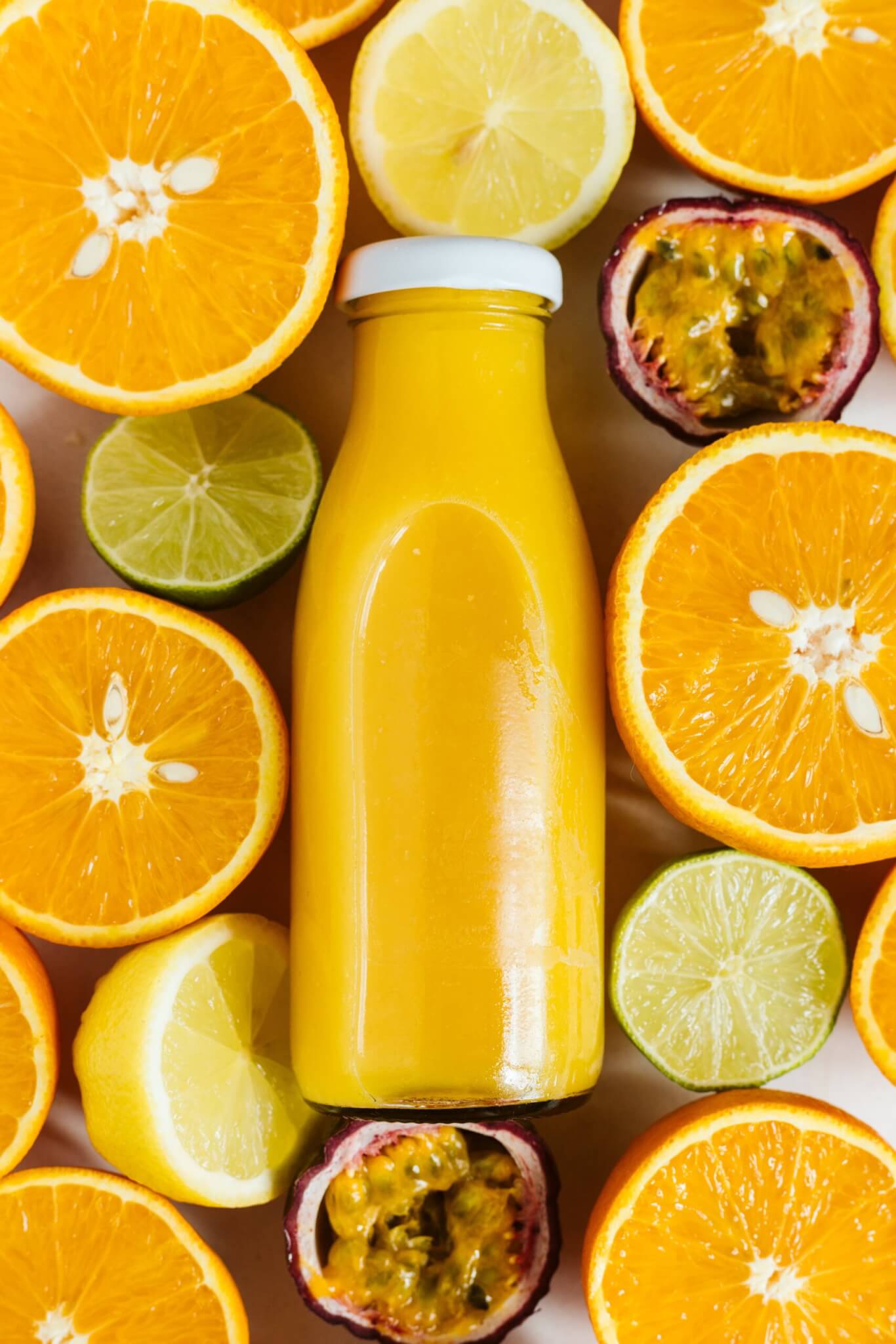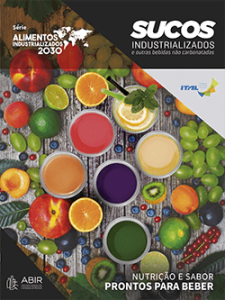CONSUMPTION TRENDS FOR INDUSTRIALIZED JUICES
Historical records prove that the habit of consuming fruit juices and refreshments at meals is part of Brazilian food culture, both among indigenous people as at the beginning of the colonization. A study conducted by Tetra Pak, in 2016, observed that the natural juice consumption prepared freshly prepared is high in Brazil, with a market estimation of approximately 2,5 billion of liters per year. The study has also identified that, even though the per capita consumption was still low, there was a high growth in the industrialized juice market, in the period within 2012 to 2015.
The study Brasil Beverage Trends 2020 highlighted that many trends can be associated to the quality of the juices realized by the consumers, with highlight to the consumption customization, seek for premium products and different flavors, valuation of natural ingredient nutritive content and also beverages produced in a sustainable way.
CONVENIENCE and PRACTICALITY
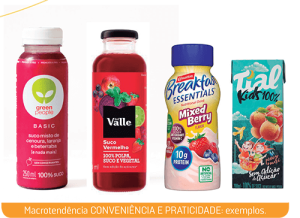 With the industrialization and advances in food and package technology, ready-to-drink juices gain the preference of many consumers, mainly due to its practicality identified in researches as one of the most important factors for the purchase these days. In fact, the Convenience and Practicality was identified in the study Brasil Food Trends ass a general macrotrend in the food sector. The study Brasil Beverage Trends 2020, specific about the juice consumption, alt highlighted, in one of its macrotrends, the convenience as part of the contemporary life style that prioritizes healthy food, but with savings in time and effort.
With the industrialization and advances in food and package technology, ready-to-drink juices gain the preference of many consumers, mainly due to its practicality identified in researches as one of the most important factors for the purchase these days. In fact, the Convenience and Practicality was identified in the study Brasil Food Trends ass a general macrotrend in the food sector. The study Brasil Beverage Trends 2020, specific about the juice consumption, alt highlighted, in one of its macrotrends, the convenience as part of the contemporary life style that prioritizes healthy food, but with savings in time and effort.
The demand for convenience has stimulated the beverages market to enable consumption, allowing the increase of fruits and vegetables intake on a daily basis in a practical way. Juices have demonstrated being a versatile product to meet the needs in different consumption occasions, and to increment the nutritive value ate breakfast, snacks for adults and kids.
The study Brasil Beverage Trends 2020 observed that juices are becoming a good option for feeding outside home, as they are healthier snacks.
CUSTOMIZATION AND E EXPERIENCE
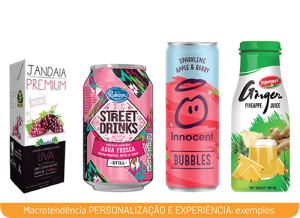 Generally, flavor is a basic factor when choosing the beverage for consumption. Among the flavors preferred by the Brazilian population we highlight grape, orange, mango, peach, passion fruit and guava. In many countries, including in Brazil, the “tasty”, “healthy” and “natural” characteristics are the most valued in 100% juice. However, there is a common desire for this type of beverage to be more affordable..
Generally, flavor is a basic factor when choosing the beverage for consumption. Among the flavors preferred by the Brazilian population we highlight grape, orange, mango, peach, passion fruit and guava. In many countries, including in Brazil, the “tasty”, “healthy” and “natural” characteristics are the most valued in 100% juice. However, there is a common desire for this type of beverage to be more affordable..
The study Brasil Beverage Trends 2020 observed that the demand for more personalized drinks that provide new consumption experiences, with diversification of flavors and premium quality has increased. The Customization and Experience macrotrend has determined the launching of new products by the juice industry, such as fruits, vegetables, grains and seeds based beverages, as well as carbonated beverages, mineral water-based drinks, mixtures with tea, coconut water and yogurt. It is important to notice that the concept of higher quality has incorporated, in addition to the juice sensory aspects, attributes related to naturalness, health, and sustainability.
AVOIDANCE AND PURIFICATION
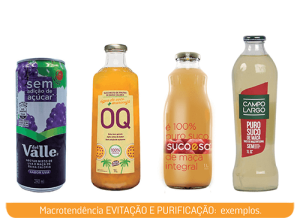 The valuation of naturalness, involving characteristics such as freshness and the present of of the fruit juice as a whole, is a trend that fostered the increase in the demand for 100% juice. And, even though they are not directly related to the juice quality, many consumers also realized the products free from undesired ingredients, such as preservatives and additives in general, as being more natural.
The valuation of naturalness, involving characteristics such as freshness and the present of of the fruit juice as a whole, is a trend that fostered the increase in the demand for 100% juice. And, even though they are not directly related to the juice quality, many consumers also realized the products free from undesired ingredients, such as preservatives and additives in general, as being more natural.
The consumers concern has been increasing about the content of sugar in the fruit juices and the search for less caloric alternatives, such as beverages with stevia, a valuable sweetener as it is considered as a natural means to replace sugar.
A survey made with Brazilian consumers demonstrated that 78% of the interviewed demonstrated to be aware of the debate about the excessive consumption of sugar.
New ingredients and processes technologies have been developed to reduce the content of sugar in juices, some of them considered as disruptive, a it is the case of the Israeli company Better Juice that patented an enzymatic technology capable of reducing up 80% of sugar in 100% fruit juices, converting the natural sugars of these juices (E.g.: sucrose, glucose, fructose) into dietary fibers molecules.
NUTRITION AND FUNCTIONALITY
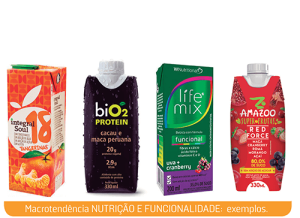 The Nutrition and Functionality macrotrend has caused a increasingly interest on consumers for juices rich in nutrients and substances capable of bringing benefits to health, such as vitamins, minerals, proteins, fibers, omega 3, probiotics, antioxidants, etc.
The Nutrition and Functionality macrotrend has caused a increasingly interest on consumers for juices rich in nutrients and substances capable of bringing benefits to health, such as vitamins, minerals, proteins, fibers, omega 3, probiotics, antioxidants, etc.
The market has offered a wide variety of juice and vegetables fruits for people interested on the beverages nutritional value and functionality, once these products are considered of higher quality by consumers.
Fruits and vegetables mixed fruits have also been a good alternative to reduce the caloric content, increase the beverages nutritive value and also add new functionalities to health. The claim for “drink your vegetable” has been attracting people interested in increasing the daily consumption of fruits, vegetables, and greenery. According to the study conducted by Tetra Pak, the development potential for new 100% juice goes beyond the traditional flavors, such as orange and apple, with opportunities for mixed beverages containing other vegetables, functional products and enriched with nutrients.
The study verified an increase of 43%, between 2012 and 2015, in launching of new beverages with vegetables. An expert in juices listed some little uncommon fruits in juices, that could be used to create products with new attractive functionalities for the consumers.
SUSTAINABILITY AND ENGAGEMENT
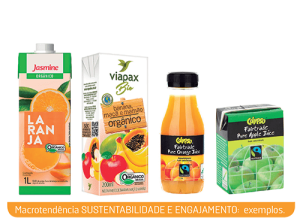 According to the study Brasil Beverage Trends 2020, the conscious consumption of juice, causing the increase of demand for beverages with organic and sustainable ingredients, raw materials from a fair and supportive commerce, locally produced, with non-pollutant packages, among other characteristics. Juices not prepared from concentrates, processed with high pressure and organic are considered as product capable of meeting the new demands from consumers.
According to the study Brasil Beverage Trends 2020, the conscious consumption of juice, causing the increase of demand for beverages with organic and sustainable ingredients, raw materials from a fair and supportive commerce, locally produced, with non-pollutant packages, among other characteristics. Juices not prepared from concentrates, processed with high pressure and organic are considered as product capable of meeting the new demands from consumers.


